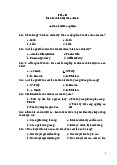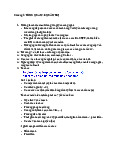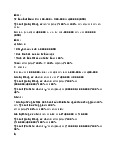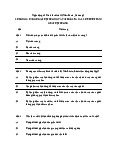
Preview text:
MID TERM TEST (120’-open book)
International Economics ECO1103E_A13E__1A23.24 Question 1 (2.0 marks)
The nominal tariff on the final commodity t=100%
The ratio of the cost of the imported input to the price of the final
commodity in the absence of tariffs) ai=0.5, and t
The nominal tariff on the imported input ti =50%
a. Calculate g the rate of effective protection
b. Recalculate g when ti =0%, ti =35%, ti =70%, and ti =100%
Question 2 (3.5 marks)
The equilibrium of domestic consumption in the small country A’s sugar
market is at Qsugar = Ssugar = 20ton/day, and Psugar = $3/kg.
a. Draw a graph to indicate economic surplus consumer surplus and
producer surplus at this equilibrium point?
b. If world sugar is trading at $1.5/kg on imported sugar and the
government of country A opens to trade. Using graph to recalculate
economic surplus of this country?
c. In case the government wants to protect domestic sugar industry and
imposes 50% ad valorem on imported sugar. Calculate government
total revenue on tariffs and dead weight losses?
d. Draw a conclusion about the effect of sugar trade on the economic surplus of country A? Question 3 (2.0 marks)
Korea can make 3 cars or 9 motorbikes in a day.
Germany can produce 4 cars or 8 motorbikes in a day.
a. Is there an absolute cost advantage? Explain
b. Calculate the comparative cost advantage for both the commodities Question 4 (2.5 marks)
Read the passage 9.7 including 9.7A, 9.7B, and 9.7C page 250-255 and
analyze the response to current trade protection.
a. What were the terms the Uruguay Round agreed on (9.7A)?
b. Why did the Doha Round fail (9.7B)?
c. What are the outstanding trade problems (9.7C)?




